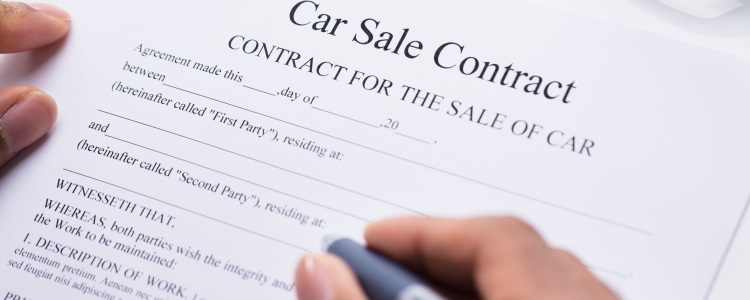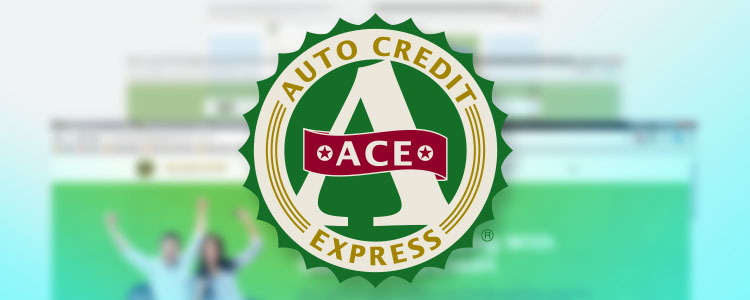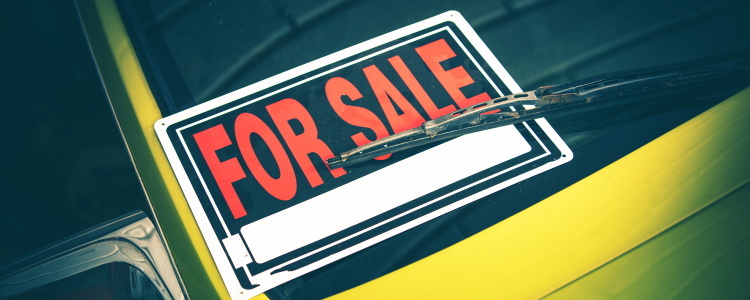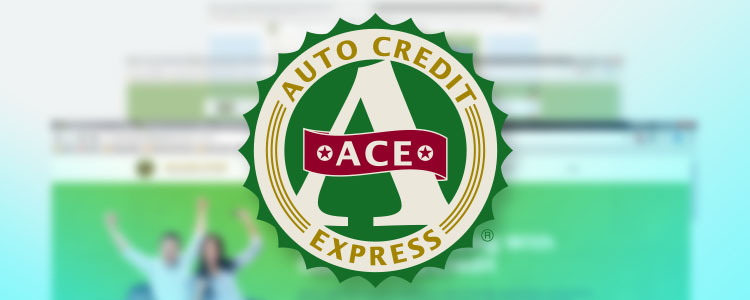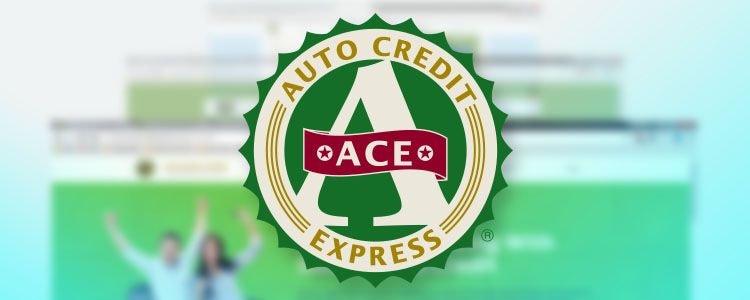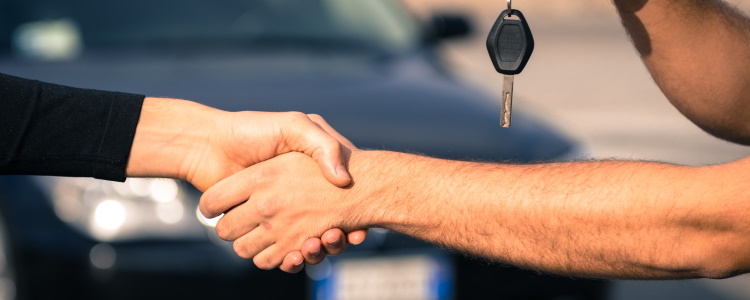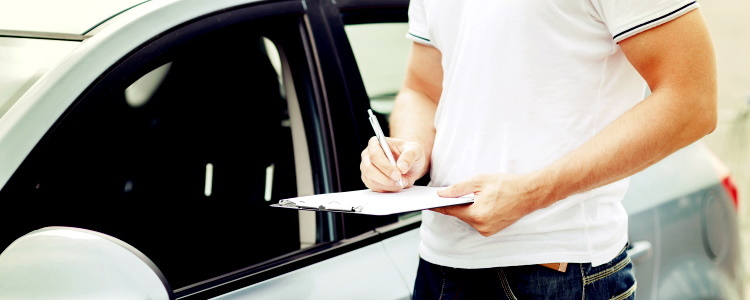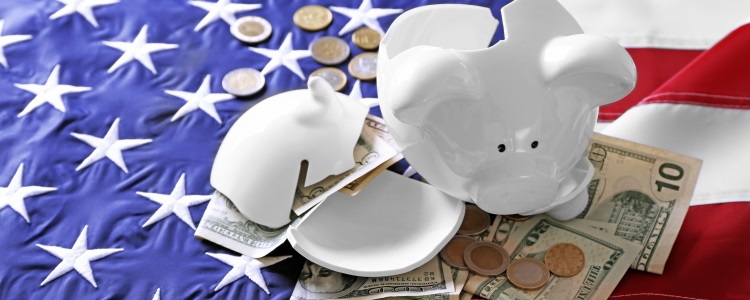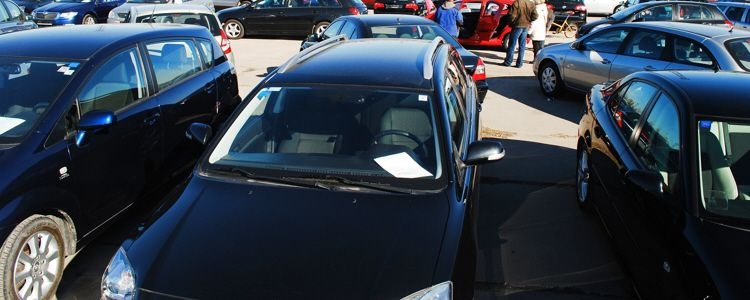When you're in the market for a new car, there is only one place to go – a new car dealership – but when you're in the market for a used car, you have two options – a dealership or a private party. Which is better for your situation? That depends on what you're looking for and whether or not you need financing.
Picking out a car that you're going to have for the next few years is a big decision, and if you need to finance that purchase – it's an even bigger decision. So say, you're looking for a gently used, well-running, low-mileage vehicle, but you don't want to spend an arm and a leg on it. Where do you go? Some people choose to go to a used car dealership for their car buying experience, but some people prefer the private party seller route more.
A private party seller is just an individual who is looking to sell their current car, as opposed to turning it in at a dealership. There are many reasons a person may choose to do this, but as a buyer, it could be advantageous to you. Specifically, when you buy a used car from a private seller, there's a lot less paperwork involved than if you're financing one at a dealership. The required paperwork when you buy or sell a vehicle yourself varies by state, but there's one universal fact: a clean and damage-free title is a must.
Financing a Used Car From a Private Seller
Not everyone is able to save up the cash to buy a vehicle outright, even an affordable choice like a private sale used car. If you need to finance a private sale, you have to get a direct loan. A direct loan comes from a bank, credit union, or another direct lender, and you typically need good credit to qualify.
When you have poor credit, it might seem logical that a private sale is a way to go – these vehicles are typically more affordable and no one is going to be checking your credit if you're paying cash. However, it can be difficult to get financing through a direct lender in these cases. If you don't have good credit, it's more likely you may qualify at a credit union, as long as you're a member in good standing.
When you apply for a direct loan, especially if you're struggling with credit issues, you need to bring in some paperwork as well. What you're required to present varies by lender. Typically, if you're working with a lender for your bad credit situation you're required to provide a valid driver's license, proof of your income, employment, and residence, as well as proof of a working phone and a list of personal references.
Paperwork for Buying a Used Car from Private Seller
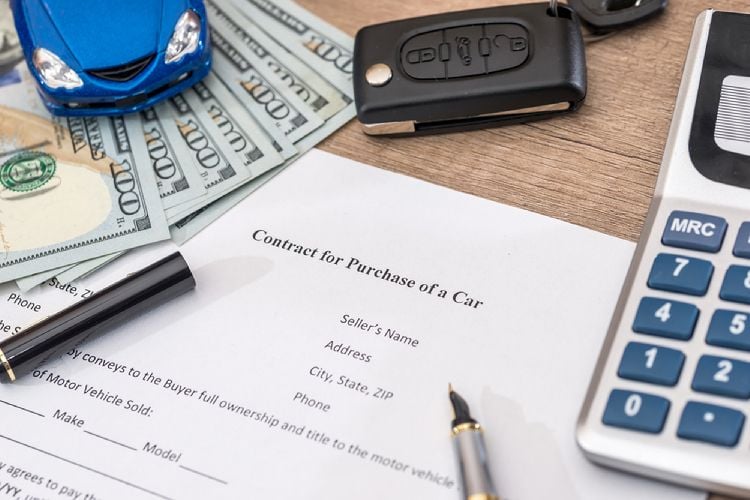
If you're buying a car for cash, you need two pieces of paperwork: the vehicle title and a bill of sale.
- Your vehicle title – The title needs to be signed over by the owner-seller to you. In most states, you can do this on your own at the time of sale. Some states require a title to be notarized, so be sure you know the law for where you live. Titles should be original and free of liens. You should be able to verify the vehicle identification number (VIN), whether or not the title is branded as anything other than clean, and the document needs to be well-cared for. If a title itself is stained, torn, or otherwise compromised, you may have trouble registering the car you purchase – some states don't accept damaged titles.
- Bill of sale – A bill of sale is always required in a private sale. This must list the buyer and seller, as well as the VIN for the vehicle, and the agreed-upon sales price. This is important because private sellers can't charge tax. However, sales tax – which is typically based on the sale price – must still be collected in most states. This is typically done when you visit your local DMV in order to register the car. Your bill of sale should also include:
- Car year, make and model
- Sale price
- Date of sale
- Names and addresses of buyer and seller
- Notation that vehicle is "Sold As-Is". This means there are no warranties or guarantees on the car and that you, as the buyer, understand this.
Because all states have their own rules and regulations governing vehicle sales, registration, and taxes, be sure you know what’s required in your state before buying or selling a car privately. Keep in mind that you'll need other paperwork to register your vehicle, including a valid driver's license and proof of insurance.
Steps for Buying a Used Car From a Private Seller
When it comes to how to buy a car from a private seller, you're taking many of the same steps as when you purchase a vehicle from a dealership, and then some. When you research your vehicles, it is important to also get a vehicle history report, and ensure that the seller has service records for the car. However, before you can consider any of that, you have to start from the top.
Here are the basic steps to buying a car from a private seller.
1. Build Your Budget
When you're shopping for a vehicle, whether new or used, you need to start with your budget. If you need financing, you may have to take this step second, after researching vehicles, so that you know how much financing you should attempt to get from your bank or credit union. When you're budgeting for an auto loan, it's important that you know your debt-to-income and payment-to-income ratios, as well as how much you need for a down payment or anything you may need upfront at the bank.
Don't forget that prices and interest rates are soaring these days and that the costs you need to budget for include more than just loan payments and fuel. You also need to account for maintenance and insurance, as well.
2. Shop for Private Sales
Once you know how much you have available to purchase your used car, you can do your research to find a vehicle that fits the bill. You can typically find these vehicles through online advertising, on social media, in the classified section of your local newspaper, or in an automotive circular like an auto trade magazine. Most sales these days will be found most quickly by searching online advertising and social media such as Facebook Marketplace or Craig's List.
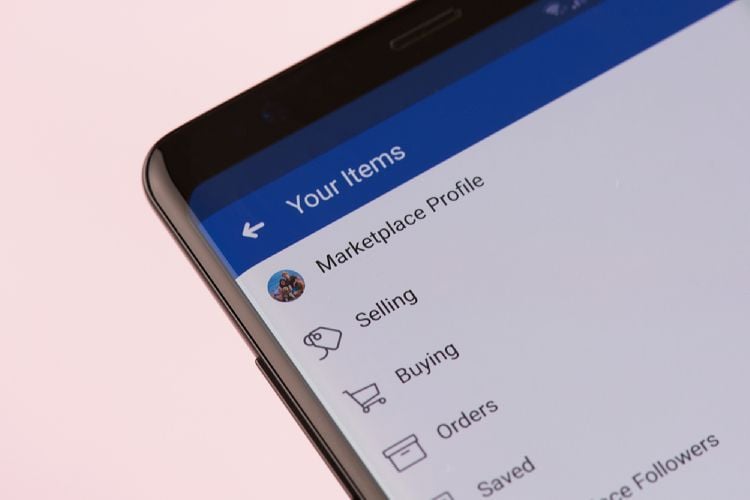
3. Meet With Seller
Once you have found a vehicle you're interested in contact the seller and set up a time to meet. Make sure that you get all the information that your seller needs so that you can help the transaction go as smoothly as possible. Be sure to meet the seller in the daytime, in a public place, or somewhere highly visible, and bring a friend, relative, or trusted mechanic with you. Along with inspecting the car, you'll want to know:
- What form of payment does the seller require
- If the seller the original owner
- If the vehicle has been in any accidents or had any major repairs
- Why the owner is selling the car
4. Test Drive Vehicle
When you take the vehicle for a test drive, bring someone with you. You should go yourself, without the seller, so you can really listen to the car and hear how it runs. If they refuse and insist on coming with you, ensure that they don't talk over potential problems or try to explain away anything that you're worried about. This could be a red flag. Additionally, make sure that you test the vehicle on different types of roads and driving situations, like stop-and-go traffic and the expressway.
5. Get a Professional Inspection
If you're satisfied with the test drive, and everything seems to be in order upon your visual inspection and test drive, it's time to schedule a check-up with a trusted and certified mechanic. They can look deeper into a vehicle than a typical person can and should be able to spot any mechanical inconsistencies that you may not have picked up on. When you're buying a vehicle from a private seller, it's up to you to ensure the car you're considering is up to par. There is no warranty or guarantee on these types of sales.
6. Negotiate Your Sales Price
Now is the time to negotiate with your seller. In order to do this, you have to do your research on the vehicle in question and take into account the condition, age, and mileage of the car. You can research this on valuation websites such as Kelley Blue Book, Nadaguides, or Black Book. Your seller will have probably done this, so you're just pulling this up to see how their price compares to the national average. You can also check other local sales of the vehicle and see if there are many in a similar condition being sold at lower prices. This may help give you a bargaining chip with the seller. Remember, though, that there are no additional costs to be bargained out of the deal like there are in sales at a dealership.
7. Go to the SOS or DMV with the Seller
Finally, you need to go to the Secretary of State, or Department of Motor Vehicles to transfer your title and take care of your taxes and registration. Remember, a private seller can't charge you sales tax on an item like a vehicle, but it still will have to be paid to the state. This is typically a simple process, but you need to make sure that you build the cost of registration and titling into your budget since these will be payments made in addition to what you pay the seller for the vehicle.
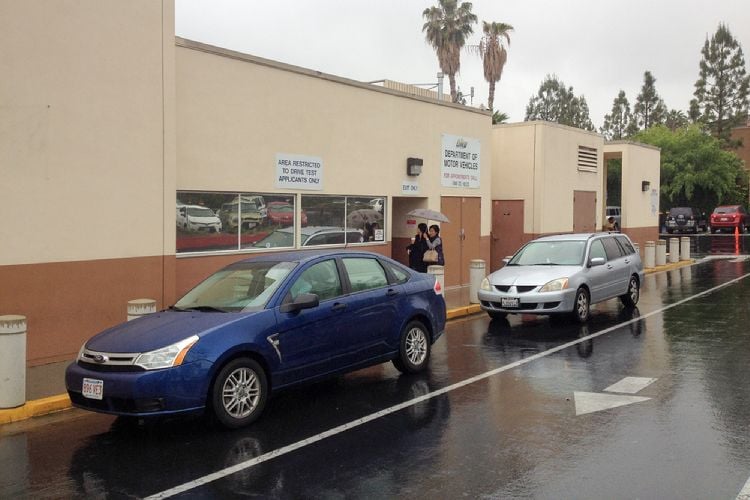
Pros and Cons of Buying a Car From a Private Seller
Some people are worried about getting ripped off when they buy a car from a private party, but what they don't know is the benefits it could pose to you. For instance, vehicles sold on a dealership lot are usually much more expensive than the same one being sold by your neighbor. Why? Well a dealership wants to turn a big profit, and in order to do that they have to take into account:
- The cost of advertising the vehicle
- Any repair costs the car may need
- Reconditioning the interior and exterior
- The salesperson commission they make when they sell the car
In order for them to make a profit on an automobile after paying these fees, they must raise the number on the price tag slightly or sometimes a lot.
Oftentimes, car owners who take impeccable care of their vehicles opt to sell the car privately because they think their trade-in is worth more than the dealer is offering. A car that runs great, and has all the service records still can be worth hundreds – or in extreme cases, thousands - more than the dealership offered for their trade-in. This doesn't just benefit the private party seller, however.
Buying a car that has been taken care of properly and has the paperwork to back it up is a huge benefit for the buyer because there is no guessing game involved. Also, while the asking price is more than what the dealership offered for the car, it is often less than what the dealership would ask for had they bought it.
On top of the benefits mentioned above, buying a car from a private party seller is usually easier to negotiate and agree on a price. This is because the seller is eager to get rid of the vehicle, and they are less likely to play games with a buyer who seems to be seriously interested in the car. In many cases, you can negotiate a selling price within a few minutes, without too much haggling.
Pros of Private Car Sales
- Lower cost to buy. Typically, a private sale used car will be more affordable than one you find at the dealership. Dealership-purchased vehicles include markups for things like advertising, lot space, and sometimes refurbishing or inspections. These are things that you're not paying for when you work with a private seller.
- More Choice. When you're looking at a dealer's lot, you're only able to shop what they have available, and sometimes vehicles move fast. When it comes to finding a vehicle from a private seller, you sometimes have a bigger window to work with, and more potential vehicles to find on your schedule, not being rushed by a dealer trying to make a sale.
- Negotiating Power. You may have more of an ability to negotiate with a private seller, since they may be more invested in making a sale to the right person. When you shop at a dealership, someone else always comes along, so sometimes dealers aren't interested in negotiating. With a private sale, the power is in your hands.
- Get Your Questions Answered By the Owner. Many times when you're purchasing a used car at the dealership, you only have a vehicle history report to go off of. There's no asking the owner why they're selling, or what has happened to the vehicle These are all things you can do when you purchase from a private seller, you can really get to know the ins and outs of the vehicle, and what they liked, or didn't about the car in question.
Cons of Private Car Sales
Purchasing a car from a private party isn't for everyone as there are some negative aspects to it. For example, you are meeting up with a complete stranger, and that can be a little unnerving to some people. This is why meetings should always be arranged during the day and at a busy place. You should always bring someone with you to the meeting, preferably someone who knows about cars so you can kill two birds with one stone – they can help you check the car out for any damage or problems that may throw you off, and give some comfort and safety should you need it.
Another big downfall is that these vehicles don't come with any guarantee or warranty attached to them – unless the car is fairly new and has not used the manufacturer's warranty. When you buy a car from a dealership they generally come with a certified used car warranty for any major repairs that could arise. These are generally for 3 months/3,000 miles or 6 months/6,000 miles, and some may even have a money-back guaranteed program.
Because used cars from a private seller do not come with these things it's up to the buyer to thoroughly inspect the vehicle and have it checked by a certified mechanic that they trust. Not having this done could end up costing you hundreds or thousands of dollars in repair costs which could add up to more than you paid for the car.
The last biggest downfall of privately purchasing a car is the fact that you must take care of all the details on your own. This includes transferring the title and tags, arranging auto financing if necessary, and selling your own car if you have one. These things can make buying a car from a certified used car dealership worth it.
- Lack of Financing. When you buy a car from a private seller this means having cash in hand or finding the financing yourself through a bank, credit union, or online lender. This can be a bit trickier if you're trying to secure financing before you find the car you want to buy. However, you also run the risk of the car selling before your financing goes through if you don't work the deal carefully.
- Unknown Factors. There are many unknowns that come with buying a car from a private seller, and unlike purchasing a vehicle from a dealership, there are no regulations in place to give you peace of mind. You have to take it on faith that the seller is on the up and up and that the vehicle you're buying is in the condition they say it is. This also means there is no warranty to fall back on if something goes wrong with the vehicle.
- Paperwork is Your Responsibility. When you go to a dealership they take care of all the paperwork, tax collection, and title transferring. However, with a private sale, you have to do all of this yourself, and it's up to you to know what is legally required when doing a car sale and filling out the appropriate paperwork.
- Getting a Vehicle History Report. Many times when you're purchasing a used car at the dealership, you have a vehicle history report provided to you by the dealership. There is no knowing if the owner will provide this, and you typically have to pay for one yourself from a site such as CarFax.
Be sure to know your credit standing, and weigh your options between a private sale and a dealership purchase carefully. Remember, there are some advantages to buying a vehicle through a dealership that you just can't get on a private sale, like a warranty.
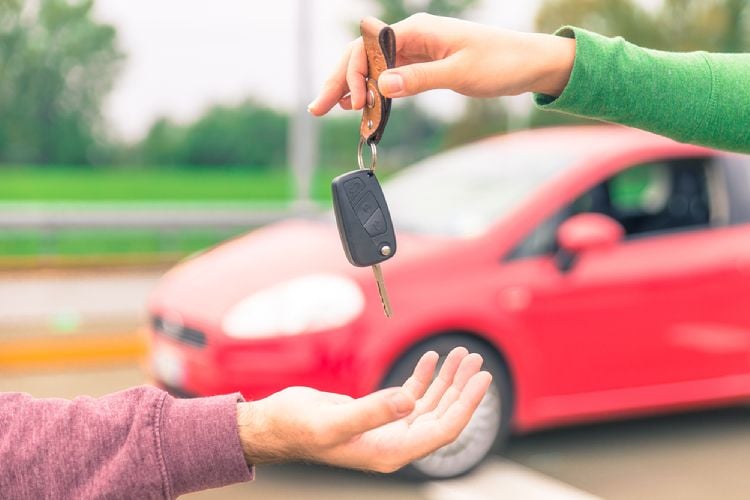
Used Car by Private Seller FAQs
Used car sales by a private seller often generate many questions from buyers and would-be sellers alike. Here are some of the more frequently asked questions about private car sales.
How to protect yourself when buying a car from a private party?
This is a question with a few layers. First, you have to protect yourself personally, by always meeting in a crowded public place, and bringing someone with you who can act as a backup should you need them in any situation. It's never good to go and meet a stranger on your own after all. Secondly, protecting yourself from damages if the car breaks down isn't really an option, so make sure you take your time, do your homework, and have the vehicle inspected thoroughly by a certified mechanic before making the purchase. Make sure that you transfer your insurance, too.
How do you know if a used car is reliable?
Again, the only way to get any kind of peace of mind from a private sale used car is to have it inspected. This goes beyond bringing your mechanic friend to the test drive with you. You should spend the extra money to have the vehicle inspected by a certified mechanic, at a brand dealership if possible. Also, make sure to get a vehicle history report, and service records from the previous owner. If they can't provide you with records, it may be an indication the car wasn't well cared for and could be a red flag.
What to check when buying a used car from a private seller?
- Check everything, and look for damages, wear and tear, and issues that may impact safety or price.
- Check the vehicle history for accidents or storm damage, such as hail damage that could the car's integrity and safety.
- Check the competition to be sure you know if you're getting a fair deal. Sites KBB.com and NADAguides are useful tools in this respect.
- Don't forget to check other local sellers for a price comparison as well.
Where can I find a private car seller?
Private sellers can be found in many places such as online, in newspapers, in trade magazines, and even just by driving around your neighborhood. There are typically many choices when it comes to where you find a private car seller.
